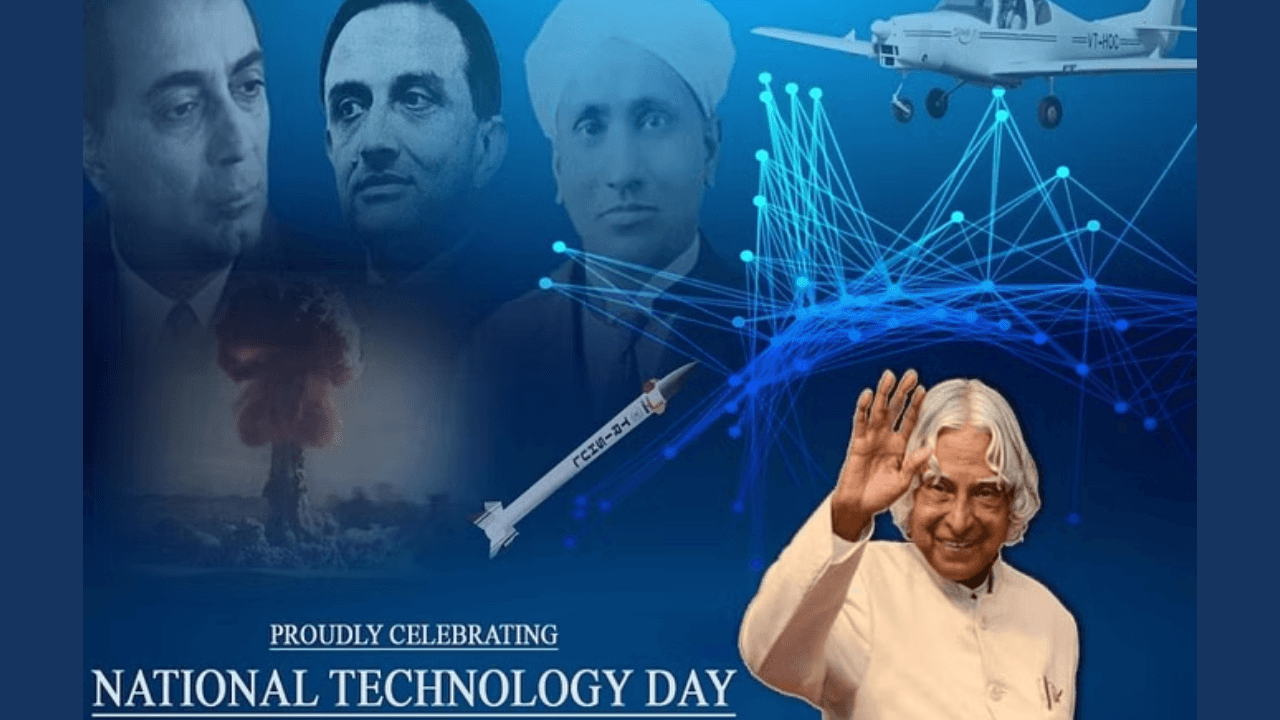National Technology Week 2023
India celebrates National Technology Day on May 11th every year to honor the achievements and contributions of scientists, engineers, and technologists towards the country’s development. This day has significant cultural and historical importance as it highlights India’s commitment to innovation and advancement in technology.
The Theme of National Technology Day 2023
National Technology Day is celebrated annually in India with a new theme being announced each year. The events of the day are planned around the theme. The theme for this year’s celebration is ‘School to Startups- Igniting Young Minds to Innovate’. This theme highlights the importance of nurturing young minds and encouraging them to innovate and create new technologies.
History of National Technology Day
- National Technology Day is celebrated on May 11th every year in India to commemorate the country’s scientific and technological achievements.
- The day is celebrated to honor the successful nuclear test carried out on May 11, 1998, at the Indian Army’s Pokhran Test Range in Rajasthan, which marked India’s emergence as a nuclear power.
- The test, named Operation Shakti, was a series of five nuclear bomb explosions conducted by India.
- The test was conducted under the guidance of Dr. APJ Abdul Kalam, who later became the President of India.
- After the success of the nuclear tests in 1998, India’s then-Prime Minister Atal Bihari Vajpayee declared May 11th as National Technology Day to commemorate the achievements of Indian scientists and engineers.
- Since then, National Technology Day has become an important event in India, celebrating the country’s achievements in the field of science and technology and promoting innovation and technological development. Each year, a theme is announced for the day’s events and celebrations.
Significance of National Technology Day
- National Technology Day holds great cultural and historical significance in India as it commemorates the successful nuclear tests carried out on May 11, 1998, at the Pokhran test range in Rajasthan.
- These tests demonstrated India’s nuclear capabilities and established it as a nuclear power.
- The day also celebrates the significant contributions made by scientists, engineers, and technologists in the development of the country and serves as a reminder of India’s dedication to innovation and its quest for technological progress.
- The day also provides a platform for promoting the importance of science and technology in the country’s growth and development.
History of India’s Nuclear Tests
- India’s nuclear tests date back to May 18, 1974, when it conducted its first nuclear test, codenamed “Smiling Buddha,” in the Pokhran region of Rajasthan.
- The test was a peaceful nuclear explosion, with a yield of around 8 kilotons, and was conducted under the leadership of then-Prime Minister Indira Gandhi.
- Following the tests, India declared that it would pursue a policy of nuclear disarmament and work towards a world free of nuclear weapons.
- However, the country’s security concerns, particularly with regard to neighboring Pakistan and China’s nuclear programs, led to a change in its stance in the 1990s.
- In May 1998, India conducted a series of nuclear tests, comprising five underground explosions, at the Pokhran test range.
- These tests were conducted under the leadership of then-Prime Minister Atal Bihari Vajpayee and included both fission and fusion devices.
- The tests were conducted in response to perceived security threats and to demonstrate India’s nuclear capability to the world.
- The tests were met with international condemnation, with several countries imposing economic sanctions on India.
- However, the country continued to pursue its nuclear program, and in 2008, it signed a civil nuclear cooperation agreement with the United States, allowing it access to nuclear technology and fuel for its civilian nuclear energy program.
- Today, India’s nuclear program is primarily focused on ensuring its national security and energy needs, with a commitment to the peaceful use of nuclear technology.
- 3 August Current Affairs 2023 in English
- MoU Between Subroto Mukerjee Sports and Education Society and All India Football Federation (AIFF) to Promote Football at Grassroot Level
- Dr. Mansukh Mandaviya Delivers Keynote Address at the 13th Indian Organ Donation Day ceremony
- Education Ministry Forms Expert Panel on Anti-Discrimination in Higher Education
- Concerns Arise Over Cheetah Deaths at Kuno National Park
FAQs
Why do we celebrate National Technology Day?
National Technology Day is celebrated in India every year on May 11th to commemorate the country’s technological advancements and achievements. On this day in 1998, India successfully conducted its first nuclear test at Pokhran, Rajasthan, which marked the country’s entry into the elite club of nuclear-armed nations. The test was conducted under the guidance of Dr. APJ Abdul Kalam, who later became the President of India. The day also recognizes the contributions of Indian scientists, engineers, and technologists in the development of the country.
In addition to the nuclear test, National Technology Day also celebrates India’s progress in other fields of technology, including information technology, biotechnology, and aerospace.
In addition to the nuclear test, National Technology Day also celebrates India’s progress in other fields of technology, including information technology, biotechnology, and aerospace.
Who declared 11th May as National Technology Day?
The Indian government declared 11th May as National Technology Day in 1999 to commemorate India’s successful nuclear tests conducted at the Pokhran Test Range in Rajasthan on the same day in 1998. The tests, codenamed “Operation Shakti,” demonstrated India’s capability of developing nuclear weapons and marked a significant milestone in the country’s scientific and technological progress. The then-Prime Minister of India, Atal Bihari Vajpayee, declared National Technology Day to honor the contributions of Indian scientists and engineers in achieving this accomplishment. Since then, the day has been celebrated every year to recognize and encourage the growth of technology and innovation in the country and to honor the technological achievements of Indian scientists and engineers.
